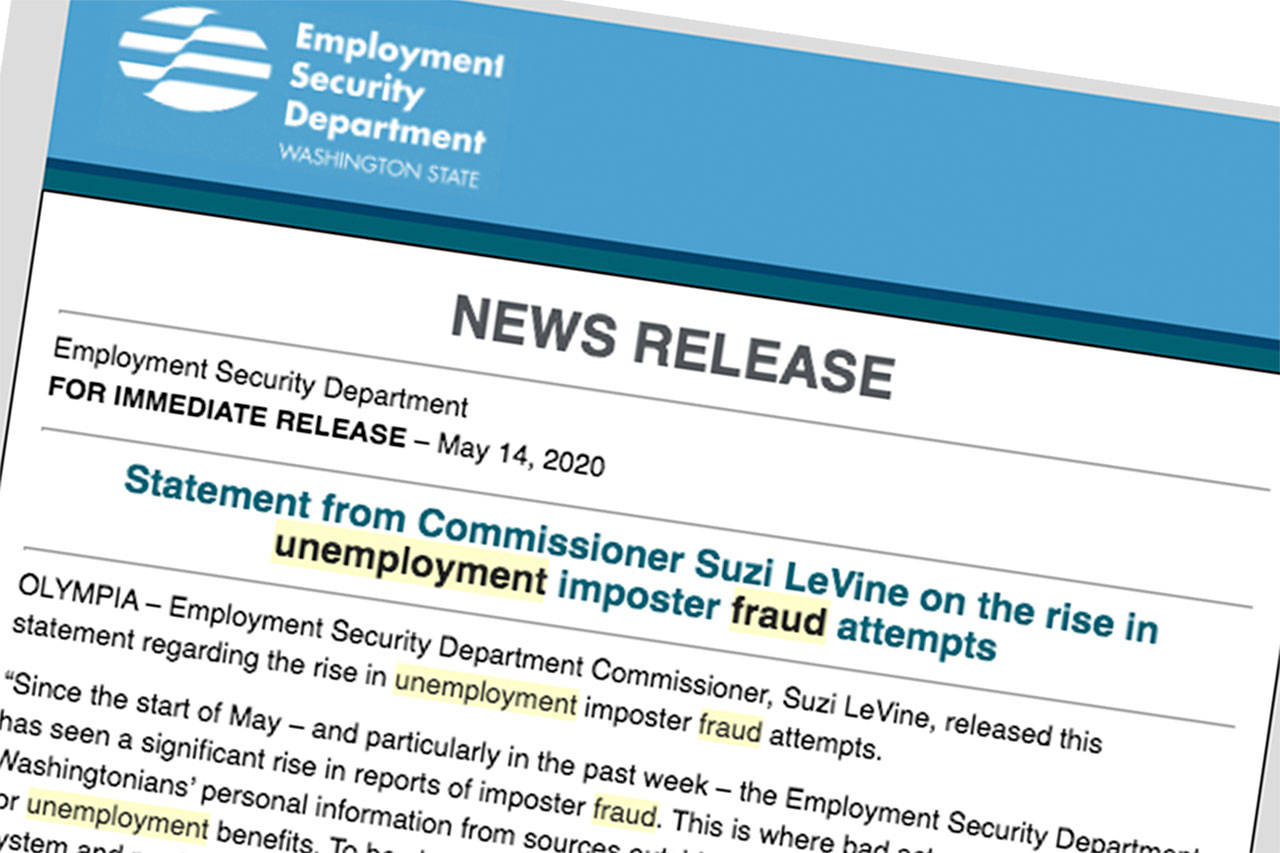By now, most everyone has heard the horror stories associated with widespread fraud associated with unemployment claims in the Evergreen State.
The story is international in scope and is repeated across the nation, but Washington seems to be a prime target. And residents of the Plateau are certainly not immune. This pristine corner of the Puget Sound region has apparently been targeted as much as anywhere by criminals taken advantage of the COVID-19 pandemic.
The fallout from “imposter fraud” was immediate and was felt by all. As the state’s Employment Security Department wrestled with stolen identities, weekly benefits were delayed; those who had been targeted were hit hard.
Those who have taken advantage of the unemployed employ methods both sophisticated and random. That is made evident by the fact that 60 cases of fraud have been uncovered within the ranks of Enumclaw city employees; of those, 21 were members of the Enumclaw Police Department, according to Chief Bob Huebler. In doing a check of his personal status, the chief found he had been targeted.
As of May 28, Huebler reported, the EPD has received an additional 53 reports from members of the community.
The two-day period of May 11-12 was the worst for Enumclaw, with 23 reports lodged, the chief said.
Across the river in Buckley, Police Chief Jim Arsanto noted that Pierce County is not exempt from imposter fraud. His department handles Buckley, Wilkeson and Carbonado and – as of early this week – the chief estimates somewhere between 15 and 20 fraud reports have been taken.
Among those, Arsanto said, were two or three members of his department who were either targeted or had family members whose identity had been compromised.
In Black Diamond, Records Supervisor Joann Sloss reported two members of the city police department have been victimized. During a seven-week span concluding May 28, she said, the department had received reports from 29 citizens who found they had been targeted.
How does this happen? According to Suzi LeVine, who heads the state’s Employment Security Department, the trouble does not originate with a data breach within her office.
“This is happening because bad actors have acquired people’s personal information through other data breaches outside of the agency,” she said in mid-May. “Criminals then use this information to fraudulently apply for unemployment benefits in someone else’s name.”
The following is a question-and-answer list pertaining to the ongoing fraud scheme. The list is taken from the Employment Security Department website.
Q: What is identity theft?
Identity theft is a crime in which an imposter obtains key pieces of personally identifiable information, such as Social Security or driver’s license numbers. Criminals use this information to impersonate someone else, usually for financial gain.
Q: What is unemployment imposter fraud?
When someone illegally files an unemployment claim using another person’s personal and employment information.
Q: How do I know if I’m a victim of fraud?
Many people find out when they receive a letter they were not expecting from the Employment Security Department. Many also find out when Employment Security notifies an employer that a current employee has applied for unemployment benefits. The employer then notifies the employee.
What should I do if I suspect I’m a victim?
If you have reason to believe someone has applied for unemployment benefits using your information, report it immediately to the Employment Security Department (esd.wa.gov).
What should I do if I’m a victim of identity theft?
Go to the Attorney General’s “Recovering from identity theft or fraud” web page and follow the instructions.
File a complaint with the Federal Trade Commission online at identitytheft.gov or call 877-ID-THEFT.
In addition, the FTC recommends that you:
– File a police report. Get a copy of the report to submit to your creditors and others that may require proof of the crime.
– Place a fraud alert on your credit reports and review your credit reports periodically to ensure no new fraudulent activity has occurred.
– Close the accounts that you know or believe have been tampered with or opened fraudulently.
– Request your free credit reports via annualcreditreport.com and review them for other fraudulent activities.
Q: If someone steals my identity and the Employment Security Department pays benefits to the fraudster, am I responsible for paying back the money?
No. You will not need to pay back the money. Your employer won’t have to repay it either.
Q: If someone steals my identity and uses my information to apply for unemployment benefits, can I still apply for benefits if I need to?
Yes. ESD will be able to distinguish a legitimate claim from a fraudulent one.
Q: How does the Employment Security Department detect fraud?
There are four main ways of detecting fraud:
– the system can spot and flag irregularities.
– ESD will cross match its data with multiple other sources, including a new national fraud detection system.
– the victim reports fraud.
– the victim’s employer reports it.
What is ESD doing to prevent unemployment imposter fraud?
ESD is working with other states and the federal government to cross match data to detect fraud. Additionally, ESD has hired additional fraud investigators and continues to use standard and creative information security practices. Finally, the department has delayed all payments to all claimants by 48 to 72 hours to allow time to root out fraudulent claims.
Q: How can I avoid unemployment scams?
Be aware of false websites. Use only ESD’s official website: esd.wa.gov.
Applying for unemployment benefits is free. ESD will never ask for a payment to process your claim.
Be wary of solicitors asking for personal information online or by phone. ESD will seek information through official correspondence and through an ESD eServices account. If ESD calls, you can ask the agents to identify themselves.


